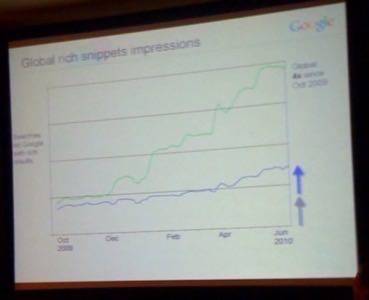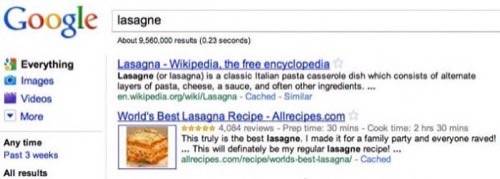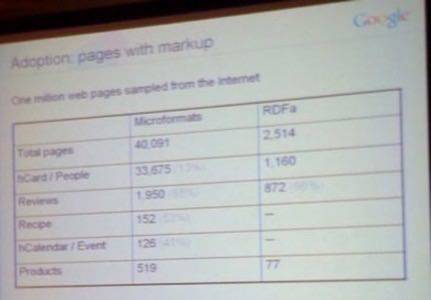At the Semantic Technology conference in San Francisco today, Google gave an update of its rich snippets initiative – which adds extra information to Google search results. For example, showing restaurant review ratings. It’s an experimental Semantic Web feature, but today’s update shows that usage is increasing and Google wants to ramp it up significantly.

Rich snippets was announced in May last year and began to be seen in results around October. At the SemTech panel today, Google’s Pravir Gupta noted that rich snippets impressions have grown four-fold globally since October 2009, with a two-fold increase on the US/English Web. Rich snippets is available in more than 40 languages.

Gupta told the SemTech audience that there are now more than 50 reviews sites using rich snippets, for example sites that offer restaurant reviews. Also there has been uptake on social networking sites, like Facebook and LinkedIn.
The most common use cases are events (which was added in January) and recipe formats. Google is adding support for more formats, such as video, local businesses and shopping.

Google is using structured data open standards such as microformats and RDFa to power the rich snippets feature. As the below chart shows, microformats is more common than RDFa for this feature.

Google spent a good deal of today’s panel continuing its drive to get webmasters to adopt rich snippets. It has a tool called the Rich Snippets Testing Tool, which helps publishers utilize rich snippets.
Finally, Kavi Goel from Google talked about how Google can accelerate growth of the ecosystem, noting that less than 5% of webpages currently have semantic markup. Google wants to see this rise to 50% or more. It is looking for critical mass, which includes adding more formats and encouraging more “beneficial peer pressure” for companies to support rich snippets. Goel cited restaurant review sites as an example – it’s not just Yelp which supports it, but other restaurant review services too.
Rich snippets is an example of how the Semantic Web is being adopted by large and powerful Internet companies, so it’s encouraging to see that Google is pushing for rapid adoption.





















